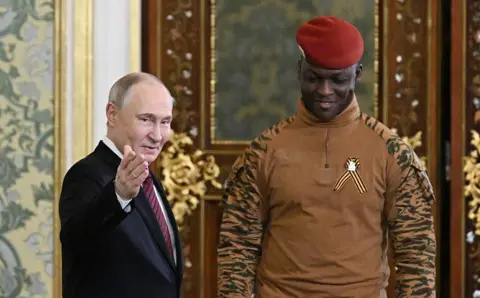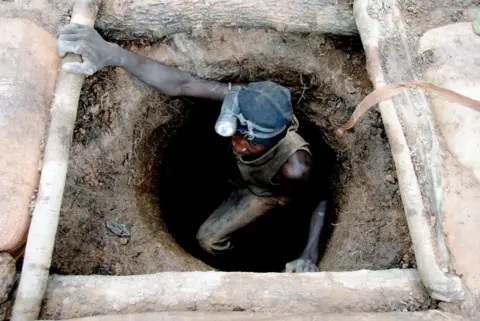JULY 2 – It has been a superb yr for gold. A number of turbulent occasions within the world economic system has pushed up costs for the glittery commodity to file highs in 2025.
In a world of tariffs and worldwide battle, gold appeals to buyers as one of many few remaining steady property. Everyone needs a bit of the motion, from central banks to giant establishments like hedge funds, and retail buyers. But few know the place their gold comes from, or a lot concerning the conflicts it might be fuelling within the nations the place it’s mined.
For the governments of West Africa’s Sahel area, the stakes are even greater. Gold is a lifeline for the army juntas of Burkina Faso, Mali, and Niger, who’re beleaguered by jihadist insurgencies, regional isolation, and the ravages of local weather change.
“Because gold costs have been at a historic excessive… the army governments are hoping that they are going to have the ability to profit immediately,” Beverly Ochieng, a senior researcher at world consultancy agency Control Risks, informed the BBC.
Together, the three Sahel states produce round 230 tonnes of gold per yr, in line with the World Gold Council’s estimates, or about $15bn (£11bn) on the present market fee.
A scarcity of information for artisanal and small-scale gold mining implies that this determine might be an underestimate.
The mixed gold manufacturing in these three states surpasses some other nation in Africa, making the Sahel area a significant world contributor to the gold market.
The governments say that the proceeds from the profitable sector are benefitting residents by way of elevated “sovereignty” – although Russian corporations are rising their stake within the business on the expense of Western-owned corporations.
For instance, Mali’s junta chief Gen Assimi Goïta laid the foundation stone last month for a gold refinery, through which a Russian conglomerate, the Yadran Group, may have a minority stake. The refinery will reportedly create 500 direct jobs and a pair of,000 oblique jobs.
Burkina Faso can be constructing its first-ever gold refinery, and has arrange a state-owned mining firm, requiring international corporations to present it a 15% stake of their native operations and to switch expertise to Burkinabé individuals.
Fake AI media campaigns have even been launched to have fun the nation’s charismatic 37-year-old army ruler Capt Ibrahim Traoré for commanding such an vital income stream for the nation.
“Mining gold from deepest filth. But souls are wealthy and true,” croons an AI-generated Rihanna in a single current tune, pouring her silky, auto-tuned reward on Capt Traoré.
The actuality may be very totally different, in line with Ms Ochieng, who defined that Burkina Faso and its neighbours want fast money to fund counterinsurgency campaigns.
In the case of Mali, a lot of this has been outsourced to Russian mercenaries, together with the Wagner Group and its successor, Africa Corps, which falls below the command of Russia’s defence ministry.
Africa Corps has been concerned in army coaching in Burkina Faso, however the junta formally denies its presence.
 RIA Novosti / Anadolu / Getty Images
RIA Novosti / Anadolu / Getty ImagesAlthough public spending transparency within the nations is poor, the governments are thought to commit giant parts of their budgets to nationwide safety.
Military spending in Mali trebled since 2010, amounting to 22% of the nationwide price range by 2020.
The governments are combating jihadist teams linked to al-Qaeda and Islamic State (IS).
But marketing campaign group Human Rights Watch (HRW) has accused the Malian authorities and the Wagner Group of committing atrocities in opposition to civilians, together with illegal killings, abstract executions, and torture.
It has documented related atrocities by Burkina Faso’s army and its allied militias.
For their providers, the Wagner Group and now Africa Corps are sometimes paid immediately in gold or in mining concessions, in line with Alex Vines of the London-based Chatham House think-tank.
“Very little [of the gold revenues] will trickle all the way down to Malians and Burkinabés,” he informed the BBC, including that actually the armed insurgents themselves could also be benefiting from gold.
Since the coup in Mali in 2021, brutal authorities ways in opposition to communities suspected of harbouring or sympathising with jihadists have elevated, pushing extra civilians to hitch the very teams they’re combating.
Jamaat Nusrat al-Islam wal-Muslimin (JNIM), an al-Qaeda affiliate which is probably the most lively jihadist group within the area, staged an unprecedented variety of assaults focusing on Burkina Faso army throughout the first half of 2025, an indication of the group’s rising power.
The armed teams are additionally actually cashing in on the elevated world urge for food for gold.
A big proportion of gold mining within the Sahel is from the artisanal and small-scale sector, which is usually casual, that means it takes place on unlicensed and undeclared websites away from authorities oversight, according to a 2023 report on gold mining within the Sahel by the United Nations Office on Drugs and Crime (UNODC).
Armed teams, together with jihadist teams, and Sahel governments are in competitors for management over many of those small-scale gold mines.
Gold offers an vital income stream for militant teams, which look like increasing their territorial affect in each Mali and Burkina Faso.
The UNODC believes that almost all gold from this kind of mining leads to the United Arab Emirates (UAE), a world centre for gold refining and buying and selling.
“You do see overlap of violent extremist teams transferring onto artisanal manufacturing areas for management,” mentioned Dr Vines.
The world spike in gold costs could also be prolonging and exacerbating battle within the Sahel – however, sadly for the diggers in artisanal gold mines, it has not led to homeowners rising their wages.
 Afrikimages Agency / Universal Images Group / Getty Images
Afrikimages Agency / Universal Images Group / Getty ImagesOne gold miner in Mali’s northern Kidal area agreed to answer written questions from the BBC on situation of anonymity, for concern of his security.
He estimated that, on a “good day”, he earns 10,000 to twenty,000 CFA francs, or roughly $18 to $36 (£13 to £26).
The quantity he’s paid has not elevated alongside world gold costs, he mentioned.
“Prices went up, however the additional revenue goes to mine homeowners… It’s dangerous and unsure, however for many people, it’s the one possibility,” he added.
Dr Vines, who previously labored as a blood diamond investigator for the UN, is anxious that gold has turn out to be Africa’s new most important battle commodity.
He famous that gold has not obtained the identical worldwide consideration as diamonds, which fuelled bloodshed in a number of African states all through the twentieth Century, particularly throughout the Nineteen Nineties.
Intervention by human rights teams and the UN led to the institution of the Kimberley Process Certification Scheme in 2003, which did a lot to finish the sale of so-called “blood diamonds” on the open market.
But makes an attempt to crack down on “blood gold” have been much less profitable.
This is partly on account of a scarcity of unified moral requirements. The London Bullion Market Association (LBMA), a significant authority within the gold market, requires refiners to adjust to requirements based mostly on pointers set by a world physique, the Organisation for Economic Co-operation and Development (OED).
The UAE’s enforcement of those laws has traditionally been patchy.
In 2021, the nation introduced its personal requirements for moral gold mining – nonetheless, the framework stays voluntary. The challenge of enforcement has brought on tensions previously between the Gulf state and the LBMA.
Tracing know-how represents one other hurdle.
“There is not any ‘DNA testing’ for gold. With a whole lot of effort, you’ll be able to hint diamonds earlier than they get polished and lower… But I haven’t seen methods of tracing the origins of a gold nugget,” Dr Vines mentioned.
Gold is smelted early on within the worth chain, making it almost unattainable to hint and connect with potential battle zones, he defined.
Dr Vines believes that it’s possible that some blood gold from the Sahel leads to UK markets.
“[Gold] will get smelted in [the] UAE, then goes onto the jewelry manufacturing business, or into dentistry, or bullion. Some of it clearly comes into the UK. And as soon as it’s right here, there isn’t a method of testing what it’s.”
Another cause that it will likely be tough to repeat the successes of the Kimberley course of, in line with Dr Vines, is as a result of the certification system was not designed to take care of state governments.
“Kimberley was designed to take care of armed non-state actors in locations like Sierra Leone and Liberia,” he mentioned.
For now, gold’s significance for Sahel governments and the patchy enforcement of moral gold requirements imply that the commodity is prone to proceed altering palms, no matter its origin.
Unfortunately for some communities within the Sahel, which will imply paying for the commerce in blood.


